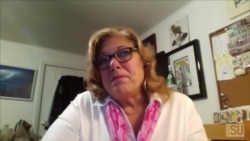Student Union
- By Sal Nicosia
Parents Say It's Love, Not Hovering!
Caroline Nicosia says she parents according to the book of love. Her son, Sal, shares his perspective.
For many young millennials, the helicopter parent phenomenon is all too real.
Are parents just overprotective because of how much they love their kids? Or are they living vicariously through them? Or do they love them so much that their children become socially disadvantaged?
As someone who grew up with a helicopter parent, I can say that there is a difference between a cautious, protective parent, and a helicopter.
My personal helicopter-parent journey really began before I was even born. My parents struggled to have a child, but were finally blessed at 40. Having a late baby, my mother (and grandmother) hailed me as a "miracle baby," an only child who was kept secluded and protected.
When it came time to go to school, local public schools weren't considered. I made most of my friends at church, many of whom I am still close to today. I very much fit the only-child stereotype: I enjoyed activities where I usually entertained myself and where my parents knew I was in a safe, non-threatening environment, like being engaged with video games and movies.
My father, Sal, an elevator technician, held a different opinion by the time I came along. He was an athlete in high school and the oldest of three children. His life and childhood were what he saw for my childhood.
But my mom, Caroline, put up much protest. So my dad took a different route, and after his retirement he and I grew close and bonded over our common love of cars. He was less cautious as a parent, allowing me to help with projects and getting my hands dirty with him.
I was sent to a nearby, small private school funded by a Baptist church. My classes were made up of no more than 10 students. As a child, I didn't know the difference. I didn't realize what else was out in the world.
From a young age, while Dad was at work and before I could go out to play, I'd sit with my mom and review spelling and vocabulary words. Like many children, I resisted school. I disliked almost everything about it. Yet she persisted, and I am grateful to her and her dedication to my education. Without the constant jousting we had, I would have become a lazy student, and I owe much of my education to her.
That being said, it boiled over one night my junior year of high school. There was a screaming match, a book was tossed in the air, and that was the last of it. I had outgrown the constant back and forth, and decided I would neglect education her way or pursue it on my own terms.
My graduating class consisted of 35 students in a school of nearly 500 that spanned kindergarten through senior year. As a high-school student, my social growth had been stunted, like many others who grew up with the same 30 kids they'd known their whole lives. There was no room for outside viewpoints. Uniforms were worn, shirts tucked in, ties worn on Wednesdays. Boys and girls were prohibited from commingling.
Contact sports were not allowed. While I understand this may have been to protect other children — I am tall, broad and solid — I wanted to be like my favorite players. But the issue was very open and shut, despite my father's protest. It wouldn't be until college that I would finally play football and hockey in recreational leagues. While it was liberating to finally have these experiences, I reflected about what could have been.
And when it came time for college, I never toured universities. I headed off to my local community college because the cost was much less — we were not a wealthy household — and it wasn't far from home. But after two years and countless dropped classes at community college, I packed my bags and moved 35 minutes down the road to Stockton University in Galloway, New Jersey — with my parents' support.

I lived a mere two miles from where I had gone to high school. I roomed with two lifelong friends I had met at church youth group. I was as focused as I was going to be, and it ultimately paid off: I am scheduled to graduate as a first-generation college student this December.
While I may sound negative regarding my childhood, there were times I relished. My mom loved to cook and I remember assisting her in the kitchen as early as 4 or 5 years old, whether it was as simple as stirring the sauce or as hazardous as cutting vegetables. I was exposed to many foods, and there's very little I won't try. I attribute my diverse palette to her love of food.
The most important part of my childhood with a helicopter parent was when the helicopter landed and the overprotective stipulations finally ended. Around the time I got my driver's license at 17 years old, the grip began to loosen. My vehicle brought freedom and the ability to explore the world on my own, even if it was just my small town in south New Jersey. My love for cars also allowed me to make friends with people who shared common ideals and priorities.
Helicopter parenting is a reaction parents have because they love their kids. That's always how I interpreted it. While there was an arm and a leg of rules to follow, and sky-high expectations to reach for, it was always for my betterment. Looking back now, I wish some things could have been different, but I'm grateful for the experiences I had as I look ahead into my adult life as an aspiring professional.
Tell us about it in the Comments and on Facebook, Twitter, Instagram, and LinkedIn, thanks!
See all News Updates of the Day
- By VOA News
Competition grows for international students eyeing Yale

It’s tough to gain admission to Yale University, and it’s getting even tougher for international students as standout students from around the world set their sights on Yale.
The Yale Dale News, the campus newspaper, takes a look at the situation here.
- By VOA News
Student from Ethiopia says Whitman College culture made it easy to settle in

Ruth Chane, a computer science major from Ethiopia, writes about her experiences settling into student life at Whitman College in the U.S. state of Washington.
"The community at Whitman College made sure I felt welcomed even before I stepped foot on campus," she says.
- By VOA News
Claremont Colleges student gets a shock when she heads home to Shanghai

In The Student Life, the student newspaper for the Claremont Colleges, a consortium of five liberal art colleges and two graduate schools in Claremont, California, student Rochelle Lu writes about readjusting to her Shanghai home after spending a semester in the United States.
- By VOA News
Cedarville University aims to ease transition for international students

Cedarville University in the U.S. state of Ohio says it’s got more than 140 international students representing 44 countries.
Here, the school interviews Jonathan Sutton, director of international student services. He talks about his job and the opportunities for international students on campus.
- By VOA News
Morehouse College offers prospective students tips on applying and thriving

Morehouse College, a private, historically Black liberal arts college in the U.S. state of Georgia, offers a guide for international students interested in attending the school.
Among the tips to apply and thrive at Morehouse:
- Take advantage of the school’s orientation program
- Turn to the school’s Center for Academic Success for tutoring, support and more
- Immerse yourself in campus life via clubs and societies
- By Reuters
US reviews Columbia University contracts, grants over antisemitism allegations

The administration of President Donald Trump said on Monday it will review Columbia University's federal contracts and grants over allegations of antisemitism, which it says the educational institution has shown inaction in tackling.
Rights advocates note rising antisemitism, Islamophobia and anti-Arab bias since U.S. ally Israel's devastating military assault on Gaza began after Palestinian Hamas militants' deadly October 2023 attack.
The Justice Department said a month ago it formed a task force to fight antisemitism. The U.S. Departments of Health and Education and the General Services Administration jointly made the review announcement on Monday.
"The Federal Government's Task Force to Combat Anti-Semitism is considering Stop Work Orders for $51.4 million in contracts between Columbia University and the Federal Government," the joint statement said.
The agencies said no contracting actions had been taken yet.
"The task force will also conduct a comprehensive review of the more than $5 billion in federal grant commitments to Columbia University."
The agencies did not respond to requests for comment on whether there were similar reviews over allegations of Islamophobia and anti-Arab bias.
Columbia had no immediate comment. It previously said it made efforts to tackle antisemitism.
College protests
Trump has signed an executive order to combat antisemitism and pledged to deport non-citizen college students and others who took part in pro-Palestinian protests.
Columbia was at the center of college protests in which demonstrators demanded an end to U.S. support for Israel due to the humanitarian crisis caused by Israel's assault on Gaza. There were allegations of antisemitism and Islamophobia in protests and counter-protests.
During last summer's demonstrations around the country, classes were canceled, some university administrators resigned and student protesters were suspended and arrested.
While the intensity of protests has decreased in recent months, there were some demonstrations last week in New York after the expulsion of two students at Columbia University-affiliated Barnard College and after New York Governor Kathy Hochul ordered the removal of a Palestinian studies job listing at Hunter College.
A third student at Barnard College has since been expelled, this one related to the occupation of the Hamilton Hall building at Columbia last year.
Canada’s immigration overhaul signals global shift in student migration
From Europe to North America, nations are tightening their immigration policies. Now Canada, long seen as one of the world's most welcoming nations, has introduced sweeping changes affecting international students. The reforms highlight a growing global trend toward more restrictive immigration policies. Arzouma Kompaore reports from Calgary.
Trump administration opens antisemitism inquiries at 5 colleges, including Columbia and Berkeley

The Trump administration is opening new investigations into allegations of antisemitism at five U.S. universities including Columbia and the University of California, Berkeley, the Education Department announced Monday.
It's part of President Donald Trump's promise to take a tougher stance against campus antisemitism and deal out harsher penalties than the Biden administration, which settled a flurry of cases with universities in its final weeks. It comes the same day the Justice Department announced a new task force to root out antisemitism on college campuses.
In an order signed last week, Trump called for aggressive action to fight anti-Jewish bias on campuses, including the deportation of foreign students who have participated in pro-Palestinian protests.
Along with Columbia and Berkeley, the department is now investigating the University of Minnesota, Northwestern University and Portland State University. The cases were opened using the department's power to launch its own civil rights reviews, unlike the majority of investigations, which stem from complaints.
Messages seeking comment were left with all five universities.
A statement from the Education Department criticized colleges for tolerating antisemitism after Hamas' Oct. 7, 2023, attack on Israel and a wave of pro-Palestinian protests that followed. It also criticized the Biden administration for negotiating "toothless" resolutions that failed to hold schools accountable.
"Today, the Department is putting universities, colleges, and K-12 schools on notice: this administration will not tolerate continued institutional indifference to the wellbeing of Jewish students on American campuses," said Craig Trainor, the agency's acting assistant secretary for civil rights.
The department didn't provide details about the inquiries or how it decided which schools are being targeted. Presidents of Columbia and Northwestern were among those called to testify on Capitol Hill last year as Republicans sought accountability for allegations of antisemitism. The hearings contributed to the resignation of multiple university presidents, including Columbia's Minouche Shafik.
An October report from House Republicans accused Columbia of failing to punish pro-Palestinian students who took over a campus building, and it called Northwestern's negotiations with student protesters a "stunning capitulation."
House Republicans applauded the new investigations. Representative Tim Walberg, chair of the Education and Workforce Committee, said he was "glad that we finally have an administration who is taking action to protect Jewish students."
Trump's order also calls for a full review of antisemitism complaints filed with the Education Department since Oct. 7, 2023, including pending and resolved cases from the Biden administration. It encourages the Justice Department to take action to enforce civil rights laws.
Last week's order drew backlash from civil rights groups who said it violated First Amendment rights that protect political speech.
The new task force announced Monday includes the Justice and Education departments along with Health and Human Services.
"The Department takes seriously our responsibility to eradicate this hatred wherever it is found," said Leo Terrell, assistant attorney general for civil rights. "The Task Force to Combat Anti-Semitism is the first step in giving life to President Trump's renewed commitment to ending anti-Semitism in our schools."
- By VOA News
STEM, business top subjects for international students

The Times of India breaks down the most popular subjects for international students to study in the U.S.
STEM and business lead the pack. Read the full story here. (January 2025)
- By VOA News
Safety and visa difficulties among misconceptions about US colleges

U.S. News & World report addresses some of the misconceptions about U.S. colleges and universities, including the difficulty of getting a visa.
Read the full story here. (January 2025)
- By VOA News
Work opportunities help draw international students to US schools

US News & World Report details the three top factors in foreign students' decision to study in the U.S. They include research opportunities and the reputation of U.S. degrees. Read the full story here. (December 2024)
- By VOA News
British student talks about her culture shock in Ohio

A British student who did a year abroad at Bowling Green State University in Ohio talks about adjusting to life in America in a TikTok video, Newsweek magazine reports.
Among the biggest surprises? Portion sizes, jaywalking laws and dorm room beds.
Read the full story here. (December 2024)
- By VOA News
Harvard's Chan School tells international students what to expect

Harvard's T.H. Chan School of Public Health reaches out to international students by detailing the international student experience at the school.
Learn more about housing, life in Boston and more here.
- By Reuters
China unveils plan to build 'strong education nation' by 2035

China issued its first national action plan to build a "strong education nation" by 2035, which it said would help coordinate its education development, improve efficiencies in innovation and build a "strong country."
The plan, issued Sunday by the Communist Party's central committee and the State Council, aims to establish a "high quality education system" with accessibility and quality "among the best in the world."
The announcement was made after data on Friday showed China's population fell for a third consecutive year in 2024, with the number of deaths outpacing a slight increase in births, and experts cautioning that the downturn will worsen in the coming years.
High childcare and education costs have been a key factor for many young Chinese opting out of having children, at a time when many face uncertainty over their job prospects amid sluggish economic growth.
"By 2035, an education power will be built," the official Xinhua news agency said, adding that China would explore gradually expanding the scope of free education, increase "high-quality" undergraduate enrolment, expand postgraduate education, and raise the proportion of doctoral students.
The plan aims to promote "healthy growth and all-round development of students," making sure primary and secondary school students have at least two hours of physical activity daily, to effectively control the myopia, or nearsightedness, and obesity rates.
"Popularizing" mental health education and establishing a national student mental health monitoring and early warning system would also be implemented, it said.
It also aims to narrow the gap between urban and rural areas to improve the operating conditions of small-scale rural schools and improve the care system for children with disabilities and those belonging to agricultural migrant populations.
The plan also aims to steadily increase the supply of kindergarten places and the accessibility of preschool education.
- By VOA News
A look at financial aid options for international graduate students in US

The Open Notebook, a site focusing on educating journalists who cover science, has complied a list of U.S. graduate program financial aid information for international students.







